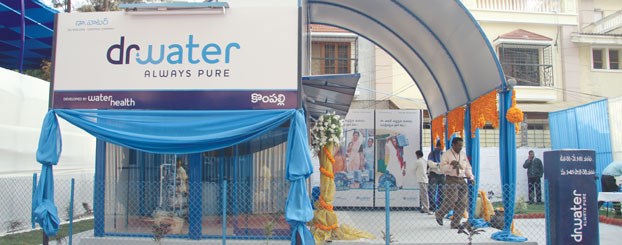
This International Women’s Day a consortium of women from 7 countries will join a group of Rotarians in Bengaluru to launch a WaterHealth Centre (WHC) in Govindrajnagar.

Explaining the WHI model, Jacqueline Lundquist, VP, Corporate Affairs, Water Health International (WHI), which operates water projects in India in Gujarat, Tamil Nadu, Karnataka, Andhra Pradesh and Telengana, says it works as a public private partnership where the company partners locally with the panchayats in communities needing clean drinking water. The local authorities provide the land for a nominal fee, along with the water source needing purification.

The land required for a WHC, which serves the need of about 10-15,000 people, is only 50ft x 50 ft. WHI typically sources funds through its corporate partners or development agencies. Once the land, water source and funds are available it takes about three weeks to build a WHC which becomes a community asset, with the WHI having the right and responsibility to operate, manage and maintain the plant for 20-25 years. The community pays a small fee for the purified water (branded Dr Water) typically in the Rs 5-7 range for 20 litres and this fee pays for the running costs of the plant. The labour is hired locally and WHI now has 1,500 employees in India. It also operates in countries like Bangladesh, Nigeria, Liberia, and Ghana.
Jacqueline, who is passionately involved with India since she came here with her husband Richard Celeste (former US Ambassador to India from 1997-2001), says that during the last 15 years they have been bringing people annually to India for trips, and the number has crossed 1,000. Last January they brought 64 people to Hyderabad. At the end of the trip each visitor contributed funds to build and launch WHCs. They also helped to launch a new foundation called Jaldhaara which aims to provide safe water to communities; water, sanitation and hygiene (WASH), education; improving health outcomes for school children – their families, and the empowerment of women, she said.
This year another group – an all-women group of 20, is visiting Delhi and on “International Women’s Day, we international women will inaugurate a WHC in Bangalore that we have helped fund. In addition Rotary groups from Bangalore and United States will also be contributing to the Jaldhaara initiative”.
Underlining the importance of reliable operations, maintenance and water quality (services that WHI provides), Jacqueline says “Many organisations just drill wells and walk away. We know that these wells have a life expectancy of 6 to 9 months and nobody monitors the quality of water. WHI, being operations and maintenance intensive and focused on water quality, stays in the community for 10-15 years, runs the plant, tests the water regularly, make adjustments and post results for the community to see the quality of water they are drinking.”
One third of WHI’s employees are women; “we offer jobs and opportunities to women, and turn the tragic story of women and water on its head,” she says. Needless to say, most of this income earned by the women goes into educating their children, including daughters.
In Bangalore WHI, working with the Bangalore Municipal Corporation, will build about 198 WHCs, for which efforts are on to raise funds. While the USAID has joined the initiative with a grant,
“we are in the process of getting additional grants from Indian foundations and will raise the rest of the money through organisations like Rotary,” says Jacqueline.
She has already got commitment for 5 WHCs from a Rotarian of Indian origin in New Hampshire, who happened to be visiting the Rotary district conference she was addressing in Bangalore in October 2014. And five Rotary Clubs in Bangalore have also pitched in with a contribution of Rs 3 lakh each. “If we can raise the money for all the 198 centres, they can be built within a year”. Having worked with Rotary for long years, including Polio eradication projects in Delhi when she lived here, Jacqueline is now in the process of joining a Rotary e club in Colorado.
Water and women
On how access to clean drinking water changes the lives of women on whom the onus rests for this essential commodity, she says that a study by the International Finance Corporation in communities where WHI operates found health care costs come down by 76 per cent once safe drinking water is made available. Infant mortality rates also fall since safe drinking water reduces diarrhoea and other waterborne diseases. “So we are improving the lives and health of children and keeping them alive. I don’t have to tell you the story of women and water… their getting up early to fetch it, leaving them vulnerable to eve teasing and harassment. To come to a safe, well lit spot in the middle of town to fetch water quickly, economically, also leaves the whole day free to work at home or outside.”
Jaldhaara and WHI have recently started a new initiative called Water for Schools, which brings safe water to a million schoolchildren. “Within the footprints of where we operate, there are a million school children within a 2-3 km radius. We have created a partnership with Sesame Street and its newest muppet, Raya, whose character is focused on educating children about safe water and proper hygiene practices and are raising funding for the project – we are also talking to Rotary about this – providing water and hygiene education for these kids.” Meanwhile, on March 8, one of the celebrities present at the event will be “our Spokes Muppet, Raya,” smiles Jacqueline.
She adds: “I once heard Madeline Albright say that ’there is a cold place in hell reserved for women who don’t help other women.’ I think of that often and am so proud to bring together these extraordinary, diverse women from India and overseas, to make a difference in the lives of women in India.”





